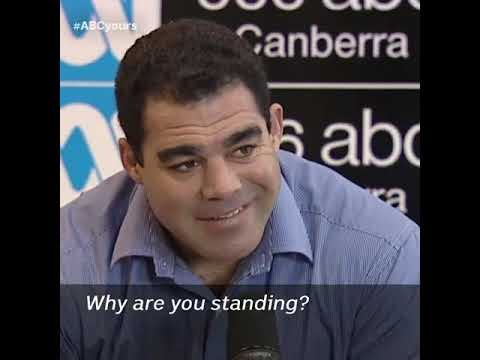Reading and listening for the weekend of the 19th February
Mal Meninga twenty years on
I was recently DMed by a fellow called Lucas on Twitter with this message.
Mr. Gruen -- I'm trying to introduce a sortition-lite idea by ballot initiative in my home state of Ohio. I'm attaching the relevant portions of a ballot initiative. If you have a chance to review, let me know. I'd love to hear your thoughts.
Before long we were chatting. He told me he’d been thinking of running for the Ohio legislature. He talked over his pitch with his wife. He had to say why the people of Ohio should vote for him ahead of others. As they drafted this statement about how great he was, they both heard the voice of shame speaking. Both agreed he sounded like he was full of shit. Naturally enough I told him of Mal Meninga — whose first and last interview as a political candidate (above) became legendary.
It struck me as a remarkable illustration of how unwelcome our political system is to very large classes of the population. A key value of ancient Greek democracy was not just freedom of speech (though they thought about that differently too!) but equality of speech or isegoria. But Mal Meninga’s story brings out a fundamentally ethical issue. Should we be so surprised that we are ruled by the shameless when those with more shame like Mal simply retire from the field?
Anyway, we explored some of these ideas in my weekly chat with Peyton where we discuss the eclipse of virtue, not just in our politics but even in thinking about politics. And towards the end of the video — which is where it starts playing if you click on the image below and don’t rewind — we discuss Mal Meninga’s moment and how Lucas chose a different path in response to his distaste for self-promotion. (If you’d rather listen on your mp3 player, you can find the recording on my Anchor channel here).
Why the West’s Diplomacy With Russia Keeps Failing
American and European leaders’ profound lack of imagination has brought the world to the brink of war.
A great short piece. Here’s what the author suggests the UK’s incompetent foreign minister could have said:
Good evening, ladies and gentlemen of the press. I am delighted to join you after meeting my Russian counterpart, Sergey Lavrov. This time, we have not bothered to discuss treaties he won’t respect and promises he won’t keep. We have told him, instead, that an invasion of Ukraine will carry very, very high costs—higher than he has ever imagined. We are now planning to cut off Russian gas exports completely—Europe will find its energy supplies somewhere else. We are now preparing to assist the Ukrainian resistance, for a decade if need be. We are quadrupling our support for the Russian opposition, and for Russian media too. We want to make sure that Russians will start hearing the truth about this invasion, and as loudly as possible. And if you want to do regime change in Ukraine, we’ll get to work on regime change in Russia.
If you fancy, you can also listen to Anne Applebaum and Andrew Sullivan interrupting each other constantly on the subject of Ukraine, but where Sullivan's disagreements with his guests are usually extremely productive, I found this conversation intensely irritating making me think less of both participants who were equally impatient.
Why is Ukraine the West's Fault?
Having listened to Applebaum’s hawkishness on Andrew Sullivan’s podcast, I’m pleased to present an alternative perspective. Over half a decade ago, John Mearsheimer took a similarly dim view of Western diplomacy but from another perspective. I listened to his lecture and had no idea it was from so long ago until he started talking about what John McCain would want.
There is no evidence that we thought Putin was aggressive before the crisis [of 2014]. … There is no evidence that we were talking about expanding NATO because we had to contain the Russians, because, NATO expansion was driven by 21st Century men and women. They believe balance of power politics is dead. Putin is a 19th Century man. He does view the world in terms of balance of power politics. As do we, when it comes to the Monroe Doctrine in the Western Hemisphere.
But in the case of Europe, we were thinking like 21st Century people. We thought we could just drive right up to his doorstep and it wouldn't matter.
We did not think that Russia was aggressive. What happened here, is after the crisis broke out on February 22, 2014, we then decided that Russia was aggressive. We then decided that Russia was bent on creating a Greater Russia. After the fact.
Why ‘Negative Screens’ are Bad (ESG)
An article I found in (of all things) the Platinum Asset Management quarterly briefing for investors (of which I’m one!). I once wrote a brief blog post about them which touched on the issue raised here.
In August 2021, BHP announced it was selling its petroleum assets (to Woodside) …We are at something of a loss to understand how it is a positive outcome for the purpose of reducing greenhouse gas (GHG) emissions.
Augustine and the politics of identity and security
Reading the words below piqued my interest in the article, even though there’s more to be said about lockdowns than is suggested in the quote which I won't rehearse here.
In his recent study of identity politics, Joshua Mitchell writes that “any serious effort to untangle identity politics will require comparing the transliteration given here to what St. Augustine wrote and believed.” He claims that identity politics is a “religious” response to perennial questions about human flaws and suffering. Identity politics’ Manichaean presuppositions lead it to locate the source of evil in classes of people instead of the human heart or will. It scapegoats classes of people and is incapable of offering any hope of redemption or reconciliation. In viewing identity politics as a religious phenomenon, Mitchell makes the Augustinian claim that it is an instance of the earthly city parodying the city of God. …The second crisis The City of God illuminates is Western governments’ (as well as China’s) policy response to COVID-19. The governments’ dystopian attempts to impose lockdowns, mandates, and restrictions—all in the name of public safety—recall what Augustine says about the Roman imperial goal of securitas.
The Nazi Officer's Wife
A Jewish survival story that is gripping, as you might expect. But though the protagonist’s driving motive is protecting herself from physical annihilation, the only means by which she can effect this is by ending her social annihilation as a fugitive from the law. Since she’s a Jew in Nazi Germany she changes her identity. And of course, at the end of it all, she must wrestle with who she really is. A gripping and profoundly beguiling story.
Wellbeing and the commons
A rather weak piece —perhaps dumbed down by The Conversation’s journalistic overlay on academia, but perhaps just by a dull academic. Nevertheless, the basic idea is hugely important and neglected by our overlords.
Some Paintings
Finally some lovely images. I’m reading and enjoying a biography of James Burnham and in a stay in Paris, he befriended a Polish artist Józef Czapski whose paintings I duly looked up. This put me in mind of a previous biography I’d read of James Baldwin who was great friends with another black artist in the US —Beauford Delaney. They renewed their friendship in Paris. Anyway, here’s a smattering of their striking pictures.
Józef Czapski
For no particularly good reason, these reminded me of a Dunera artist Klaus Friedeberger who I only recently discovered. In searching for him I found this website on the Dunera from the folks at Monash who are doing so much to document the Dunera episode, with a particular interest in the art the Dunera folks produced. You can click on various buttons and the visual resources rearrange themselves to highlight what you’ve selected.













